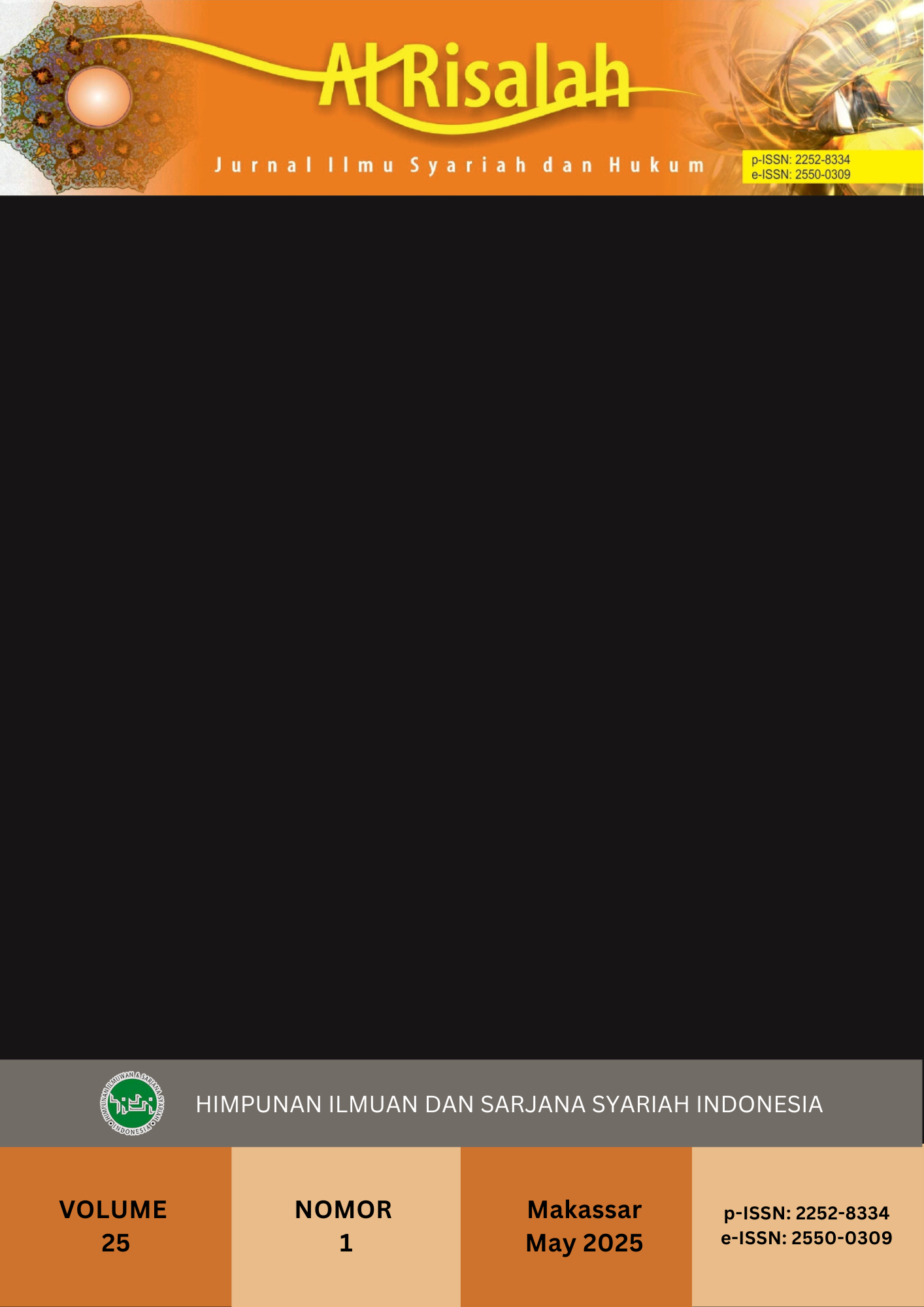Postponing Pregnancy for Economic Reasons: An Islamic Juridical-Empirical Study in Air Genting Village, Asahan
Abstract
This study aims to examine the perspectives of scholars in Asahan regarding the postponement of pregnancy due to economic factors and its implications for married couples in Air Genting Village. While Islam encourages procreation as part of the sunnah, couples often consider financial stability, health, and psychological readiness before deciding to have children. This research employs a qualitative field study with a juridical-empirical approach. Data were gathered through observations and in-depth interviews with married couples who have chosen to delay pregnancy, as well as discussions with local scholars to understand the Islamic legal perspective on this issue. The collected data were analyzed descriptively, with triangulation applied to ensure the validity of findings. The findings reveal that economic concerns, particularly the ability to provide for children’s basic needs such as food, education, and healthcare, are the primary reasons for delaying pregnancy. However, scholars from the Indonesian Ulema Council (MUI) in Asahan assert that postponing pregnancy for financial reasons is not permissible in Islam, as each child’s sustenance is believed to be guaranteed by Allah. Nonetheless, delaying pregnancy is considered acceptable if done for health-related reasons or to ensure maternal and child well-being through birth spacing. This study contributes to the discourse on Islamic family planning by providing empirical evidence on how economic factors influence reproductive decisions within the framework of Islamic law, specifically in the local context of Asahan. The study highlights the need for educational programs on pregnancy planning that align with Islamic teachings while addressing economic realities. Additionally, policymakers should consider strategies to improve the economic welfare of young couples, enabling them to make informed reproductive choices without financial distress.
References
Albi Anggito & Johan. Metode Penelitian Kualitatif. Jawa Barat: Jejak, 2018.
Andi Risnawaty. “Strategi Penyuluhan Agama Dalam Memberikan Bimbingan Pranikah Di Kua Kecamatan Salomekko Kabupaten Bone.” Institut Agama Islam Muhammadiyah Sinjai, 2020.
Apriyanti, Dwi Anggun. “Perlindungan Perempuan Dan Pernikahan Di Bawah Umur.” PAMPAS: Journal of Criminal Law 2, no. 1 (2021): 115–24. https://doi.org/10.22437/pampas.v2i1.12676.
AS, Interview with Asahan Community, 2024
Ghazaly, Abdul Rahman. Fiqih Sunnah Jilid 4. Jakarta: Pena Pundi Askara, 2009.
Helmawati. Pendidikan Keluarga. Bandung: Rosda Karya, 2014.
Idris Marpaung, Interview with Religious Leaders, 14 January 2025
Indoensia, Undang Undang Republik. Undang Undang Republik Indoensia Nomor 1 Tahun 1974 Pasal 1 tentang Perkawinan (1974).
Islamy, Imam El. Publik Dalam Pemberdayaan Masyarakat Islam. Tesis, 2020.
Kusuma, Adi Prastiya, and Erlina Erlina. “Problematika Pernikahan Usia Dini.” Alauddin Law Development Journal 3, no. 1 (2021): 45–52. https://doi.org/10.24252/aldev.v3i1.12171.
Mahmudin Lubis, Interview with General Secretary of MUI Asahan, 12 Agustus 2024
Muhammad Suherman, Interview with Secretary of Fatwa Commission MUI Asahan, 12 August 2024
Nasution, Dr. Abdul Fattah. Metode Penelitian Kualitatif. Экономика Региона, 2017.
Nayla, Abu. Keluarga Kecil Islami. Yogyakarta: Darul Hikmah, 2017.
Pamessangi, Andi Arif, Hasriadi Hasriadi, Muhammad Zuljalal Al Hamdany, Muh. Yamin, Nur Fakhrunnisaa, Makmur Makmur, Erwatul Efendi, Asgar Marzuki, Ismail Ismail, and Aldhy Abdullah. “Edukasi Pencegahan Pernikahan Dini Melalui Pendidikan Agama Islam.” Madaniya 5, no. 2 (2024): 718–27. https://doi.org/10.53696/27214834.820.
Pramanasari, Yolan Dita Ayu, and (2021). “Bimbingan Pranikah Bagi Calon Pengantin Untuk Membangun Keluarga Sakinah Kantor Urusan Agama Kecamatan Plaosan Kabupaten Magenta. Institut Agama Islam Negeri (IAIN) Ponogoro.” Institut Agama Islam Ponorogo, 2021.
Raco, J. R. Metode Penelitian Kualitatif. Grasindo, 2010.
Rahma, Salsabila Fatin Maulida. “Analisis Pernikahan Dini Atas Hak Anak Dalam Perspektif Hak Asasi Manusia (Studi Kasus: Kecamatan Pringapus Kabupaten Semarang).” Gema Keadilan 10, no. 3 (2023): 127–37. https://doi.org/10.14710/gk.2023.20386.
Rahmi. “Strategi Kantor Urusan Agama (KUA) Kecamatan Ulee Kareng Dalam Mengoptimalkan Program Bimbingan Perkawinan (BIMWIN) Pranikah. Universitas Islam Negeri AR-Raniry Darussalam Banda Aceh.” UNIVERSITAS ISLAM NEGERI AR-RANIRY DARUSSALAM-BANDA ACEH, 2021.
Ramadan, Sahrul. “Kesadaran Hukum Terhadap Larangan Pernikahan Dini.” Jurnal El-Thawalib 3, no. 2 (2022): 262–74. https://doi.org/10.24952/el-thawalib.v3i2.5297.
Ramdhan, M. Metode Penelitian. Medan: Cipta Media Nusantara, 2021.
Salim, Abu Malik Kamal Bin As-Sayyid. Shahih Fiqih Sunnah. Pustaka At- Tazkia, 2006.
Salman Abdullah Tanjung, Interview with Chairman of MUI Asahan, 2024
Santoso. “Hakekat Perkawinan Menurut Undang-Undang Perkawinan, Hukum Islam Dan Hukum Adat.” Jurnal YUDISIA 7, no. 2 (2016): 412.
Sholihah, Rifdatus. “Hukum Mencegah Kehamilan Perspektif Imam Ghazali Dan Syekh Abdullah Bin Baaz.” Al-Hukama’ 9, no. 1 (2019): 76–102. https://doi.org/10.15642/alhukama.2019.9.1.76-102.
Somantri, Muhamad Dani. “Keluarga Berkualitas.” Kajian Hukum Islam 3, no. 2 (2018): 212–13.
Sumbawati, Novi Kadewi, A Asmini, Heni Juliawati, and Binar Dwiyanto Pamungkas. “Efektivitas Program Keluarga Harapan (Pkh) Dalam Meningkatkan Kesejahteraan Masyarakat Desa Ropang.” Jurnal Ekonomi & Bisnis 8, no. 3 (2020): 194–203. https://doi.org/10.58406/jeb.v8i3.570.
Suryani, Danik, and Wahid Abdul Kudus. “Fenomena Menikah Muda Dikalangan Remaja Perempuan Di Kelurahan Pipitan.” Jurnal Pendidikan Sosiologi Dan Humaniora 13, no. 2 (2022): 260. https://doi.org/10.26418/j-psh.v13i2.54437.
Syarqowi, Ahmad. “Konseling Keluarga: Sebuah Dinamika Dalam Menjalani.” Alirsyad: Jurnal Pendidikan Dan Konseling 7, no. 2 (2017): 69–83.
Utami, Sri. “Aktivitas Sosial Ekonomi Masyarakat Di Sekitar Pelabuhan Perikanan Bulu Kabupaten Tuban Propinsi Jawa Timur.” Unnes, 2015.
Undang Undang Republik Indoensia, “Undang Undang Republik Indoensia Nomor 1 Tahun 1974 Pasal 1 Tentang Perkawinan” (1974).
Wahyuni, Sri, Rufiatul Amaliyah, Farhah Hafifah Septiani, and Cipta. “Sistem Hukum Perkawinan Di Indonesia Menurut Persepektif Hukum Perdata.” Jurnal Mahasiswa Karakter Bangsa 1, no. 2 (2021): 143–49.
Copyright (c) 2025 Fatia Aisyah Putri, Irwan

This work is licensed under a Creative Commons Attribution 4.0 International License.


